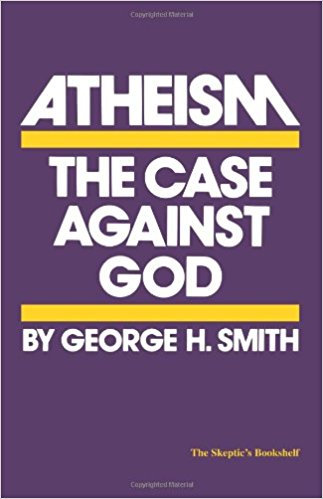Every nook and cranny of the argument
by George H. Smith
Review by Brian R. Wright
 This book is from a special era, when one of the major issues of the young budding World Libertarian was faith vs. reason, usually represented in belief in a supernatural being or not.[1] As an ideologue and activist in the early American libertarian movement—let’s pick a timeframe: I’ll say from the publication of Robert Heinlein’s The Moon is a Harsh Mistress (1966) to the 1979 Libertarian Party Nominating Convention in Los Angeles, California—I took part in a number of debates on the existence of God. My intellectual foundation was located principally in the works of Aristotle, and Ayn Rand, who was an explicit advocate of reason.
This book is from a special era, when one of the major issues of the young budding World Libertarian was faith vs. reason, usually represented in belief in a supernatural being or not.[1] As an ideologue and activist in the early American libertarian movement—let’s pick a timeframe: I’ll say from the publication of Robert Heinlein’s The Moon is a Harsh Mistress (1966) to the 1979 Libertarian Party Nominating Convention in Los Angeles, California—I took part in a number of debates on the existence of God. My intellectual foundation was located principally in the works of Aristotle, and Ayn Rand, who was an explicit advocate of reason.
Rand, although an atheist, didn’t dwell on making arguments against the various intellectual citadels of faith the various religions, particularly Christian ones, put out to support their concepts of God. As Nathaniel Branden, at one time Rand’s designated intellectual heir, put it: Objectivists don’t spend a lot of time examining the follies of mystic belief, including the idea of “God.” In his words, “The adversary is too unworthy.” Which of course you can take in a couple of ways; if you didn’t hang with the Randians, you probably thought it a bit high-handed. Still, Branden wrote what I regard as one of the best arguments against the standard concept of God as first cause. I have it as a jpeg, and will post on my site here:
This little gem helped me win a few arguments with the rampant Christian faithniks of that era, though to be fair, when one side advocates reason and the other side advocates faith—which in this context is the acceptance of ideas or allegations in the absence of sensory evidence or rational demonstration—the advocate of reason has a big edge… if people in the audience care about logic. Anyway, I liked the Branden take on causality being in the universe, not the universe being in causality, and one thing led to another. I was always a reader, and theism fascinated me. The following two books were key: Continue reading
